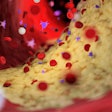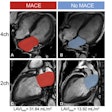
Measurements of visceral adipose tissue on MRI exams are associated with a patient's cognitive function, independent of cardiovascular risk factors, according to research published online February 1 in JAMA Network Open.
A team of researchers led by Dr. Sonia Anand, PhD, of McMaster University and Hamilton Health Sciences in Canada compared cognitive test results with body fat percentages and MRI measurements of visceral adipose tissue in a cross-sectional study of over 9,000 subjects. After adjusting for cardiovascular risk factors and MRI-detected vascular brain injury, the researchers found that higher levels of both adiposity metrics were associated with reduced cognitive scores.
"Strategies to prevent or reduce adiposity may preserve cognitive function among adults," the authors wrote.
Prior cross-sectional studies assessing the potential associations for CT or MRI evaluation of visceral adipose tissue measurements with cognitive function have had mixed results. Some studies have reported an inverse association between increased visceral adipose tissue and cognitive function, while others had found a protective effect of visceral adipose tissue on cognitive function, according to the researchers.
To investigate the association between adiposity with vascular brain injury and cognitive scores, the researchers analyzed 9,189 adults without cardiovascular disease from two previously performed studies: Canadian Alliance for Healthy Hearts and Minds (CAHHM) and Prospective Urban Rural Epidemiological-Minds (PURE-MIND).
The patient cohorts had an average age of 57.8 and included 5,179 women. Most (83.8%) were of white European ethnicity.
Of these adults, 9,166 received bioelectrical impedance analysis to determine body fat percentage and 6,773 were also given a short noncontrast MRI exam of the brain and abdomen to assess vascular brain injury and to measure the volume of visceral adipose tissue. The MRI exams were performed on either a 1.5- or 3-tesla scanner.
The body fat and visceral adipose tissue results were modeled into sex-specific quartiles and then compared with the participants' scores on both the Montreal Cognitive Assessment and the Digital Symbol Substitution Test (DSST). The DSST is a 2-minute cognitive test that assesses visual-motor speed and coordination, as well as capacity for learning, attention, concentration, and short-term memory.
The researchers found that visceral adipose tissue measurements on MRI correlated highly (r = 0.76 in women and r = 0.70 in men) with body adiposity measured by body fat percentages. Higher body fat percentage or visceral adipose tissue volume were also associated with vascular brain injury.
| Increased risk for reduced cognitive function from higher adiposity measurements | ||
| Body fat percentage | Visceral adipose tissue measured on MRI | |
| Population-attributable risk for a reduced DSST score, adjusted for cardiovascular risk factors and vascular brain injury | 20.5% | 19.6% |
After adjusting the results for cardiovascular risk factors and vascular brain injury, the researchers found that for every standard deviation increase in either body-fat percentage (9.2%) or visceral adipose tissue (36 mL), the DSST score was lower by 0.8 points -- a statistically significant result for both measurements (p < 0.001).
The researchers noted, though, that a higher body fat percentage and visceral adipose tissue were not associated with Montreal Cognitive Assessment scores.
"Future investigations, including mechanistic studies and randomized clinical trials, are required to elucidate the pathways by which high levels of adiposity reduce cognitive scores, independent of its effect on other cardiovascular risk factors," the authors wrote.




















